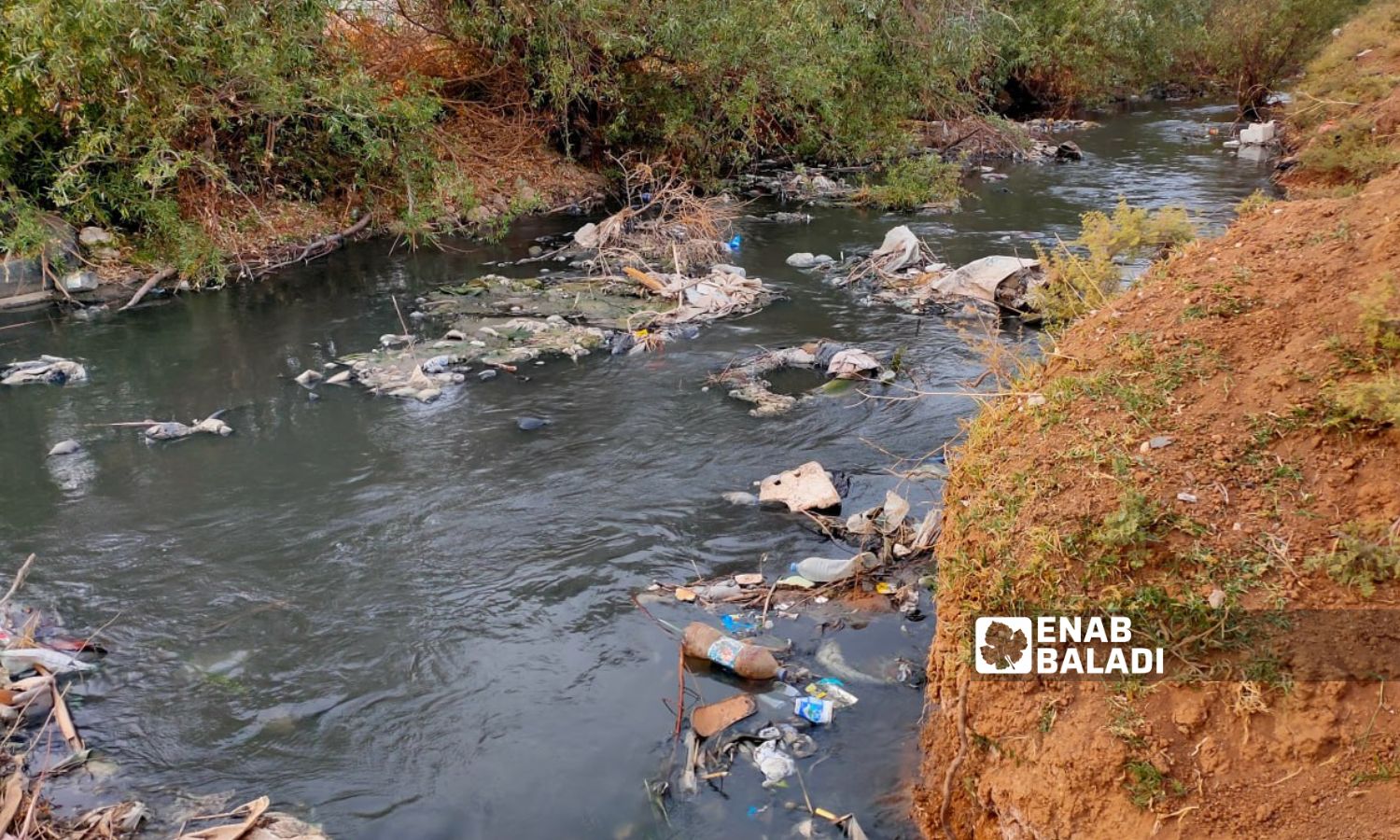



Enab Baladi – Al-Hasakah
Residents of a number of neighborhoods in the northeastern city of Qamishli complain about the contamination of drinking water as a result of the damage to the drinking water network and its mixing with sewage water, as well as the lack of access to the upper-floor houses.
Polluted water with a yellow color and bad smell, which turned from potable water into a source of diseases, prompted the people to resort to “unhealthy” and financially costly alternative solutions, including mobile tanks, most of which are not subject to health control and expensive purification filters.
Mohammad, a resident of al-Zuhour neighborhood, explained to Enab Baladi that the drinking water coming through the main network to the neighborhood has turned yellow for several weeks, and its bad smell varies from one street to another and from one house to another within the same neighborhood.
Mohammad, in his forties, said that the neighborhood’s problem with the sewage network and water distribution lines is not new, as the network’s infrastructure is dilapidated and old and the transportation pipelines are constantly damaged, and streets are flooded with polluted water.
The man, who preferred to hide his full name, added that the tunnel digging operations carried out by the Kurdish-led Syrian Democratic Forces (SDF), which controls the area within the neighborhood and its outskirts, exacerbated the situation, exposing the lines to damage, as well as delaying maintenance for a long period of time, noting that excavation remains are still present in some streets to this day.
The SDF worked to establish a network of tunnels extending underground in its areas of influence as a defense plan for fear of possible Turkish military moves in northern Syria against it and linked through the tunnels its main centers inside Qamishli city.
Water pollution has extended to most of the city’s neighborhoods, in addition to the lack of access to upper floors and higher areas, which forces residents to operate generators that incur additional financial burdens.
George Shalabi, 44, based in the western neighborhood, told Enab Baladi that the water supply to the neighborhood is bad. Residents of high floors in the neighborhood suffer from poor water access to their homes.
He explained that this problem has caused many quarrels and fights between the neighbors themselves to obtain water, as the owners of the upper floors object to the operation of the suction pumps by others before they get the water.
Shalabi needs to fill the house tank more than once a month to cover the needs of his family of four, which increases the financial burden on them in light of the economic deterioration and the depreciation of the Syrian pound.
He added that if the poor water situation continues until the summer season, the situation will be worse and warns of a crisis because water consumption doubles with the rise in temperatures.
In addition to the scarcity and pollution of water in some neighborhoods, some people are forced to boil it before using it for cooking purposes.
Manal, of al-Seryan neighborhood, told Enab Baladi that she has to boil water before using it to prepare food, as it is not suitable for making tea. “The water looks turbid as if it has been mixed with mud.”
The water should be boiled and cooled to be reused after a while due to the high lime content in it, she added.
The neighborhoods of al-Hilaliyah and al-Muazafeen suffer from poor access to water and its interruption for many days.
Alternative solutions differ according to what is available in each neighborhood of Qamishli. In order to secure potable water, people in al-Zuhour neighborhood resort to transporting it by various means from neighboring neighborhoods via private cars, or carrying it on shoulders (bottles with a capacity of five and ten liters), or buying it from private tanks at a cost about 15,000 SYP per 1,000 liters of water.
Shalabi said that people in the western neighborhood are intermittently forced to buy drinking water at their own expense, at a price ranging between 15,000 and 20,000 Syrian pounds per 1,000 liters.
Water filters that are installed in the kitchens of homes on the main water line are one of the solutions to get rid of the problem of water calcification in the city’s neighborhoods, but they are expensive and not affordable for everyone.
The prices of the filters range between $75 and $120 and vary according to the quality, the country of origin, and the number of purification stages, according to what Enab Baladi’s correspondent monitored during a tour of shops that sell energy and water purification tools in the city.
($1=7710 SYP) according to the S-P Today website, which covers the trading rate of the Syrian pound to the dollar.
In early February, the Water Directorate in Qamishli of the Autonomous Administration of North and East Syria (AANES) that manages the region announced the start of constructing a water collection tank with a capacity of 3,000 cubic meters at the al-Hilaliyah station, which is one of the largest water stations in Qamishli, and is fed by about 51 wells, and the cost of the tank is about $500,000.
Wasel Asaad, administrator at the Water Directorate, told Ronahi newspaper, which is close to the AANES, that the contract period is three months, and during this period, the project must be put into service, after which the old tanks will be maintained, to achieve uninterrupted water pumping.
At the beginning of last March, Asaad told a local radio station that only 20% of the reservoir project had been completed.
if you think the article contain wrong information or you have additional details Send Correction